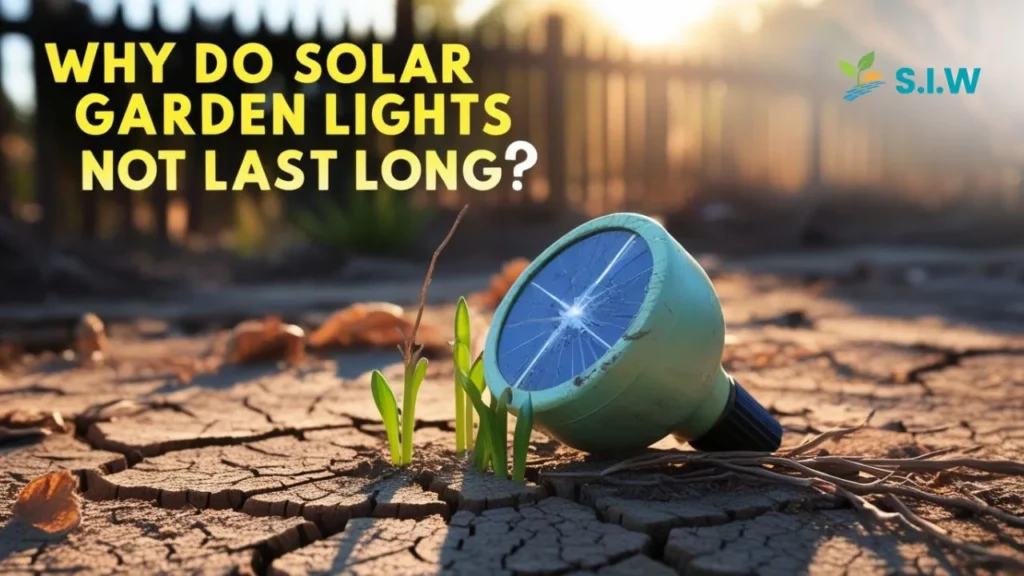Solar garden lights are an energy-efficient and eco-friendly way to illuminate outdoor spaces. However, many users find that these lights don’t last as long as expected. In this article, we will explore the primary reasons why solar garden lights have a limited lifespan and offer tips to improve their longevity.
Common Causes of Short Lifespan in Solar Garden Lights
1. Battery Degradation
The most common reason for solar garden lights not lasting long is battery degradation. Solar lights use rechargeable batteries, typically Nickel-Metal Hydride (NiMH) or Lithium-Ion (Li-Ion). Over time, these batteries lose their ability to hold a charge, especially when exposed to outdoor conditions like heat, cold, and humidity.
Key Factors Affecting Battery Life:
- Temperature Extremes: Both high and low temperatures can negatively affect battery performance. Batteries degrade faster in hot weather, while cold temperatures can reduce their ability to charge.
- Number of Charge Cycles: Rechargeable batteries have a finite number of charge cycles, and each full charge depletes their lifespan a little more.
2. Poor Quality Solar Panels
Low-quality solar panels are another reason solar garden lights fail prematurely. The efficiency of solar panels determines how much sunlight they can convert into electricity. Cheaper solar lights often have panels that degrade faster due to substandard materials or manufacturing defects.
Signs of Failing Solar Panels:
- Cloudy or Discolored Panels: A common sign that the solar panel is deteriorating is a cloudy or yellowed appearance on the panel surface.
- Reduced Charging Efficiency: When solar panels can no longer convert sunlight efficiently, the battery doesn’t receive enough energy to keep the lights on through the night.
3. Inadequate Sunlight Exposure
Solar garden lights need adequate sunlight to function optimally. Poor placement or seasonal changes that limit sun exposure can drastically reduce the amount of energy stored, leading to dim or short-lived lighting.
Best Practices for Sunlight Exposure:
- Correct Placement: Ensure the solar panel is placed in an area that receives full, direct sunlight for at least 6-8 hours daily.
- Avoid Shaded Areas: Objects such as trees, buildings, or garden structures can block sunlight and prevent proper charging.
4. Weather Damage
Since solar garden lights are placed outdoors, they are vulnerable to weather conditions. Rain, snow, wind, and extreme temperatures can all cause damage to the solar lights, reducing their lifespan.
Weather-Related Issues:
- Water Ingress: If water seeps into the solar light’s casing, it can damage internal components like the battery and LED bulb.
- UV Damage: Continuous exposure to UV rays can degrade the plastic or glass casing, making it brittle and prone to cracking.
5. Faulty LED Bulbs
While LEDs are generally long-lasting, cheap or defective bulbs can burn out more quickly than expected. Low-quality LEDs may also suffer from reduced brightness over time.
Why LED Quality Matters:
- Energy Efficiency: High-quality LEDs convert more electrical energy into light, which is crucial in maximizing the power stored by the solar panel.
- Durability: Top-tier LEDs can last for years, but lower-quality versions may suffer from inconsistent light output or early failure.
How to Extend the Life of Solar Garden Lights
1. Use High-Quality Batteries
Replacing the default batteries in your solar garden lights with high-quality NiMH or Li-Ion batteries can extend their lifespan. It’s important to choose batteries with a high capacity and designed for outdoor use.
2. Clean and Maintain Solar Panels
Regularly clean the surface of the solar panel to remove dirt, dust, and debris that can block sunlight. For solar panels cleaning, use a soft cloth and mild soap, avoiding harsh chemicals that could damage the panel.
3. Proper Storage During Off-Season
If you live in an area with harsh winters, consider storing your solar lights indoors during the off-season. Extreme cold can shorten the battery life and damage the casing.
4. Replace Worn-Out Components
Monitor the condition of the solar lights regularly. Replace any worn-out parts, such as damaged LEDs, broken casings, or deteriorated batteries, to ensure your lights remain functional.
5. Invest in Weather-Resistant Models
Look for solar garden lights that are specifically designed to withstand tough weather conditions. Lights with a higher IP rating (Ingress Protection) are better protected against dust and water.
Solar garden lights offer a sustainable solution for outdoor lighting, but their longevity can be impacted by several factors, including battery degradation, poor sunlight exposure, and weather conditions. By understanding these issues and following proper maintenance practices, you can significantly extend the lifespan of your solar garden lights.








